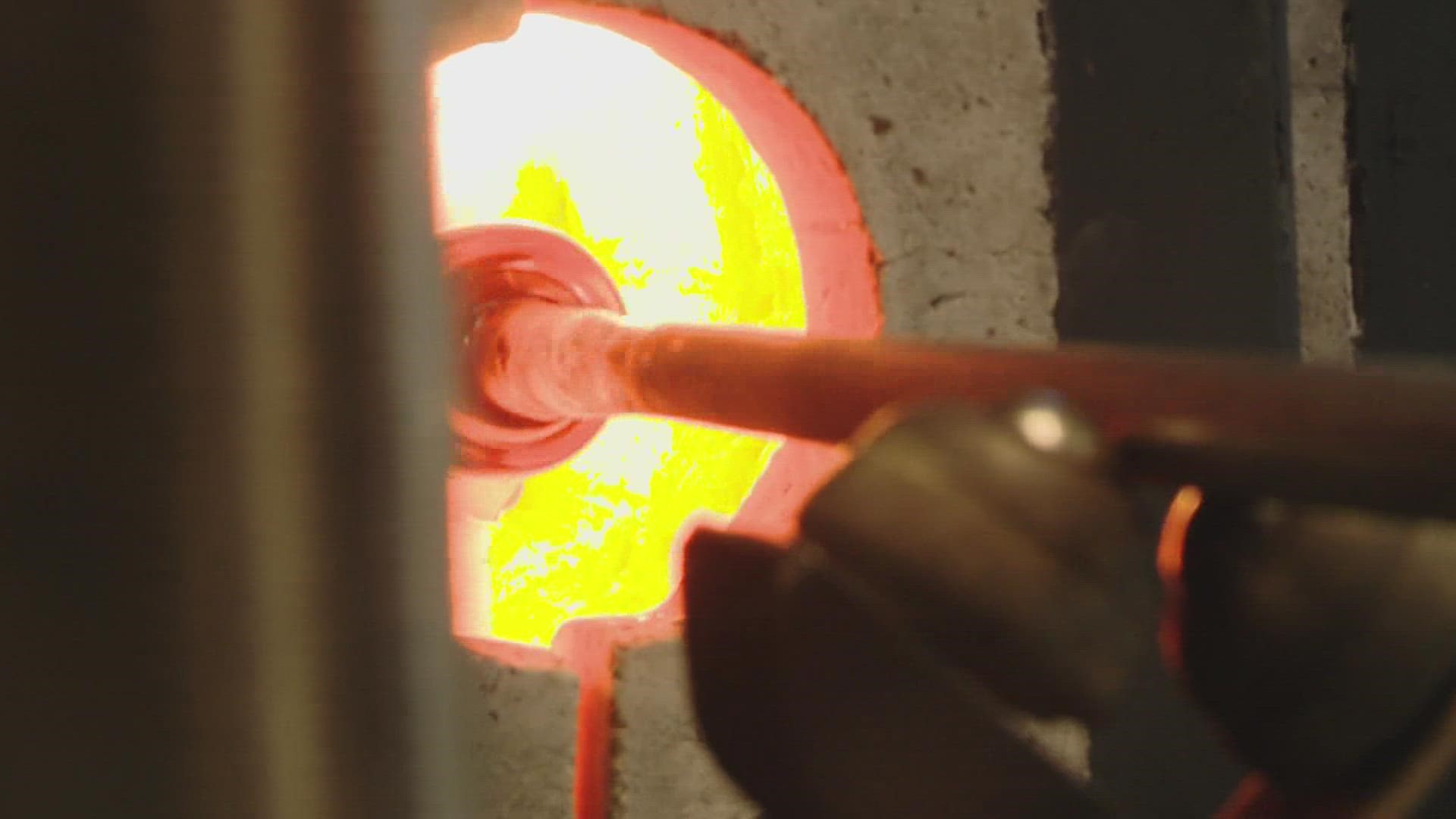It’s magical,' says founder David Jacobson. 'What makes it unique is that it’s captivating.'
BELFAST, Maine — Before the COVID-19 pandemic, David Jacobson owned a glassblowing studio in Montville.
"One man shop, making glass, giving lessons, and then COVID really impacted me, basically had nothing left," Jacobson said.
With little left of his business, he approached Waterfall Arts in Belfast to see if he could bring his talents there. The arts center already offered ceramics, photography and printmaking.
Chris Battaglia is the marketing manager for Waterfall Arts.
"I think there’s such a universal interest in glass right now that this capitalizes very randomly and luckily for us in that way," Battaglia said.
Jacobson offered to donate the equipment from his studio, teach classes, and in return he’d have a place to work on his own art.
Friend and fellow glass artist Carmi Katsir came on board. Together, they led the renovation of this former fallout shelter.
"We want people to experience this – we have so much fun with it and we just want to share that," Katsir said.
They opened the doors a few months ago.
"Now it’s grown in to the only school of its kind in the state of Maine, community based, we’re burning used vegetable oil as one of our heating sources, totally cutting edge. It’s just grown into a huge fantastically exciting project," Lacobson said with a smile.
No one is more excited about the studio than a group of Belfast Area High School students. Senior Emily Martell has taken other art classes, but this one is satisfying in a different way.
"There’s something about the 3-D medium of glass that’s like really fun to work with – and like heating it up and stuff, it’s just very exciting!" she said.
The process of glassblowing moves quickly – once you start, you can’t stop.
"You’re focused, you’re in it, and you’re going," Jacobson said, speaking from experience.
Katsir explained it this way: "We start out with a guided experience so we can have someone make something in a safe way but then each part of the process takes years and years to perfect, a glass, a bowl those are great starting points."
100 pounds of clear, liquid glass rests in the furnace set at over 2100 degrees. The rods and blow pipes are kept warm – in the pipe warmer – so the molten glass sticks to the metal when it is gathered. Color can be added by rolling the clear glass in colored glass on a thick, steel table that shapes and cools the glass. Each time the glass is reheated in the forge – which runs at 2300 degrees – it is rotated to keep it centered. Out of the forge, they can bring it back to the bench where they change the shape, blow it out, and use the shears or tweezers to manipulate the glass.
"This is like the glassblower’s office," Katsir said of the glassblower's bench. "We have all our tools here, we sit down at the bench here and we’re rolling the rods back and forth."
The students are each making a glass pumpkin. The molten glass goes in a mold which adds some lines to the design. They also use a wooden paddle to flatten the bottom of the glass.
"Like any art from that you want to become good at it just takes a lot of time and commitment," Jacobson said of the art form. "And the thing about glass is – I just wanna say – is it’s magical! What makes it unique is that it’s captivating and you fall in to two camps. Either you’re sucked in and you wanna learn more of it, or you’re very intimated by the heat, the process, all that it entails, and you say 'no thank you'.
Jacobson envisions that years from now, this will become a very influential glass center in New England.
"It’s all silver lining and I feel extremely fortunate and I have to say a lot of it was never on my radar, never part of my plan to do something this large and to be teaching like this and teaching the high school kids ... but everything just started to move in that direction," he said. "I was thinking, 'Who am I to stop this? Who am I to say no to something that’s just… bigger than me?' and here we are. And it’s gonna keep growing."
The glassblowing studio is open to the public, and people have come to take classes from across the state. If you would like to learn more about Waterfall Arts, click here.

